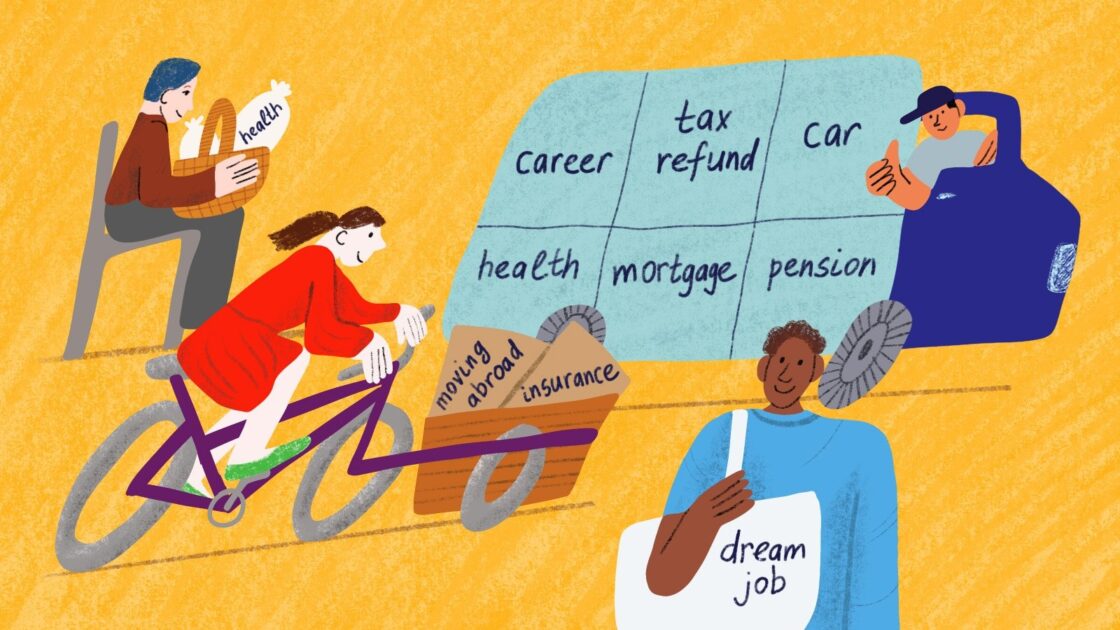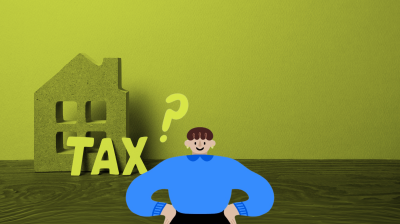11 ways to get your sh*t together
Feel like you need to get your life in order? You’re not alone.

Life can be complicated. The older you get, the more responsibility you have, the more overwhelming it can be. Rent, bills, healthcare, getting paid, finding work, paying taxes, figuring out your next step – it can all be a bit much.
The first thing to remember is that you don’t need to have it all figured out. While there’s some great information, advice, and support out there, most people are making it up as they go along, and that’s okay. Go at your own pace, and remember there’s support available if you’re feeling overwhelmed. Even if you feel alone in what you are going through, there is someone who has been where you are now and made it through.
We want to help you get your life together – but just because you haven’t done all of the things on this list doesn’t mean you’re not already doing the best you can. You don’t need to do these things to be a ‘successful’ adult or have it all ‘together’- but if you’re looking for some information, this list might have you covered.
How to get your sh*t together
Remember, you don’t need to do it all at once – and you may never do some of these things, which is okay too. If you’re feeling overwhelmed, try picking one or two things to focus on, and break it down into smaller, more manageable tasks.
1. Figure out your career
There are many points in our lives where we are asked to make decisions about the type of career we want. However, what we thought we wanted to do in school isn’t necessarily what we end up doing later in life, and that’s okay.
Whether you have a very clear career path in mind or you’re still figuring things out, deciding on your goals and putting steps in place to get there can help you to find the job that’s right for you.
This might mean:
- Researching different career options and paths
- Doing a course to develop new skills
- Volunteering to gain experience or find your interests
- Updating your CV and cover letter
- Developing your goals
2. Learn to manage your money
Between paying for the essentials like rent, groceries and bills and enjoying your social life or funding a hobby, life can get expensive. If you’re finding it difficult to keep on top of your expenses each month, it can help to sit down and take a look at your finances to figure out where you can cut some expenses and how to save.
Here are some places to start when it comes to learning how to manage your money:
3. Find out if you’re due a tax refund
When you start working for the first time, you must register yourself as soon as possible with Revenue (who collect taxes). This is to avoid paying emergency tax. You must do this even if it is a part-time or temporary job.
If you’re an employee in Ireland, then your tax will come out of your pay cheque each time you get paid. Since you don’t have to think about it, you may not be paying close attention to how much you’re paying or whether you’ve been paying too much.
If you’ve overpaid your tax in the last four years, then you can ask Revenue to refund the amount you overpaid. You could end up getting quite a bit of money back if you’ve been paying too much tax over the last few years.
You might also be entitled to claim tax back on medical expenses/tuition fees or get something back on broadband/heating if you are remote working, so it’s worth exploring your options.
Find out how to get a tax refund.
4. Moving out and renting
For some people, moving out and renting simply isn’t an option right now. If that’s the case for you, you’re not alone. If you’re living with family or moving back in, there are ways you can try and keep a sense of independence while living at home.
If you are in a position to rent, or you have no choice but to find a place to live, then there may be challenges along the way when it comes to finding a place, dealing with housemates, and paying your bills. Here’s some information that might help:
5. Taking steps towards a mortgage
Some people have a goal of one day owning a home, while for others this isn’t a goal at all, or something that seems impossible. A mortgage might seem like something far in the distance for you, or maybe you feel ready and able to take this step now. The first thing you’ll need to do when it comes to preparing for a mortgage is save. The sooner you start saving, the better, and you can start with small amounts – it all adds up over time. Once you’re ready, you can contact a mortgage advisor or speak to a bank about taking the next step.
Find out how to save for a mortgage.
6. Think about starting a pension
A pension is a way of saving for your retirement by putting small amounts of your earnings aside every week or month throughout your working life. This will then provide you with an income after you retire.
Retirement might be the last thing on your mind now, but planning for the future is important, and the sooner you can start a pension, the better.
Find out how to start a pension.
7. Learning to drive and getting a car
Although taking public transport or walking or cycling can be better options for the planet and for our health, sometimes it is necessary to have a car. This is especially true if you live in a rural area with few public transport options, or if you need a car for accessibility reasons. If that’s the case, then there are several steps you can take to start driving:
- What is the driver theory test?
- Everything you need to know about the driving test
- How to buy a car in Ireland
8. Thinking about moving somewhere new?
Do you need a change? Are you considering a move abroad? Moving to a new country can be an exciting experience – it can be challenging but rewarding. If you’re thinking of moving somewhere new, make sure to do lots of research around the country you want to go to, the type of work available, the documents you’ll need, and how much the cost of living is.
Here are some ways to start planning your move:
- How to move to a new country
- Applying for college abroad
- How EURES can help you to find a job in Europe
9. Prioritise your health & wellbeing
When we’re caught up in the day to day and dealing with a lot of different things in life, it can be easy to let other priorities slip, like looking after our health and wellbeing. While the other areas on this list have their place, perhaps none of them are as important as our health. The thing is, if we make the time to look after ourselves, it can make it much easier to manage the other challenges that life can bring.
Here are some ways you can prioritise your health & wellbeing:
- Do I need health insurance?
- How to motivate yourself to lead a healthy lifestyle
- How to exercise if you don’t have the time
- Look after your sexual health by getting tested regularly for Sexually Transmitted Infections (STIs)
10. Make time for your mental health
It’s important to look after our mental health through all of life’s ups and downs. Not only can this make it easier to face new challenges, knowing how to handle negative experiences can also help to protect your mental wellbeing when times are tough. You can also support your wellbeing by surrounding yourself with friends and family who are supportive and who make you feel good. Here are some ways you can work on looking after your mental health now:
- What is counselling and how can it help?
- 5 ways to look after your wellbeing
- What can mindfulness meditation do for your mental health?
- How to meditate when you don’t have the money or the time
11. Protect your privacy and information
When was the last time you changed your passwords? Do you have the same login for every account? Taking time to clean up our accounts and update our passwords can pay off, especially if there’s a data leak or someone figures out the password you’ve been using for the last 10 years.
Here are some ways to check up on your digital privacy and security:
- How to protect your privacy and security online
- How to know if you’ve been hacked
- How to set up two-step verification
- How to create a strong password
- How to keep your financial information safe online
Illustrations by Marina Marinina.
Need more information, advice or guidance?
We offer information, advice and guidance about the issues that matter to you. Our online Youth Information Chat service is for 16 to 25 year olds and is available Monday to Friday, 4pm to 8pm (excluding Bank Holidays).






